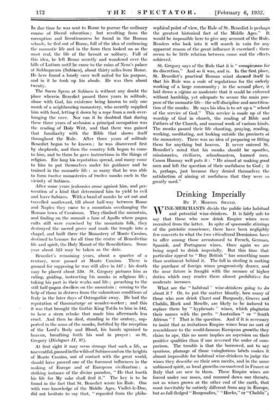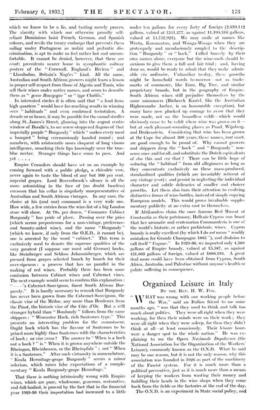Drinking Imperially
BY P. MORTON SHAND.
WINE-MERCHANTS divide the public into habitual and potential wine-drinkers. It is fairly wield say that those who now drink Empire wines were recruited from the latter. In spite of spasmodic stirrings of the patriotic conscience, there have been negligibly few converts to what the two viticultural Dominions have to offer among those accustomed to French; German, Spanish, and Portuguese wines. Once again we are being urged to drink imperially. But this time that particular appeal to "Buy British" has something more than sentiment behind it. The fall in sterling is making the purchase of foreign wines progressively dearer, and the near future is fraught with the menace of 'higher duties which may render them almost prohibitive for moderate incomes.
What are the " habitual " wine-drinkers going to do about it ? Or, to put the matter bluntly, how many Of those who now drink Claret and Burgundy, Graves and Chablis, Hock and Moselle, are likely to be induced to replace them by " hyphenate " wines, Which plagiarize their names with the prefix " Australian " Or "South African " ? That is the question. And if it is necessary to insist that as imitations Empire wines bear no sort of resemblance to the world-famous European growths they claim to ape, this no more implies an aspersion on their positive qualities than if one reversed the Order of ethn- parison. The trouble is that the borrowed, not to say spurious, plumage of those Vainglorious labels makes it almost impossible for habitual wine-drinkers to judge the wines they describe on their own merits, and in the same unbiassed spirit, as local growths encountered in France or Italy that are new to them. These Empire wines are forced under our noses, and rammed down our. throats, not , as wines grown at the other end of the earth, that must inevitably he entirely different from.any hi Europe, but as full-fledged " Burgundies," "Hocks," or Chablis"i
which we know to be a lie, and tasting merely proves. The alacrity with which our otherwise proudly self- reliant Dominions hoist French, German, and Spanish colours, and revile the treaty embargo that prevents them sailing under Portuguese as unfair and pedantic dis- crimination, is apt to make us feel rather hot and uncom- fortable. It cannot be denied, however, that there FUT ersatz precedents nearer home in sycophantic railway posters of the "Cornwall, England's Riviera" and " Llandudno, Britain's Naples" kind. All the same, Australian and South African growers might learn a lesson in proper self-respect from those of Algeria and Tunis, who sell their wines under native names, and scorn to describe them as " genre Bourgogne" or " type Chablis."
. In interested circles it is often said that "a lead from high quartets '.' would have far-reaching results in winning over " habituals " and even confirmed teetotalers. A decade or sti hence, it may be possible for the casual stroller along St. James's Street, glancing into the august centre window of Boodle's, to see screw-stoppered flagons of that imperially purple " Burgundy" which " makes every meal a banquet being ceremoniously handed round ; and members, with aristocratic noses eloquent of long vinous intelligence, smacking their lips knowingly over the true- blue nectar. Stranger things have come to pass. And Empire Crusaders should have set us an example by coming forward with a public pledge, a chivalric vow, never again to taste the blood of any but 100 per cent. imperial grapes. Lord Beaverbrook's silence is all the More astonishing in the face of (no doubt baseless) rumours that his cellar is singularly unrepresentative of Australian and South African vintages. In any ease, the choice at his (and our) command is a very wide one. How wide, a few entries from the wine-list of a big London store will show. At 78s. per dozen, " Coomaree Cabinet Burgundy" has pride of place. Passing over the price (which seems preposterous for a non-vintage, preference- and bounty-aided wine), and the name "Burgundy" (which we know, if only from the 0.E.D., it cannot be), one is arrested by the word "cabinet." This term is exclusively used to denote the supreme qualities of the very greatest (I suppose one must add German) hocks, like Steinberger and Schloss Johannisberger, which are pressed from grapes selected bunch by bunch for their over-ripeness : a process that has no parallel in the making of red wines. Probably there has been sonic confusion between Cabinet wines and Cabernet vines. The next example would seem to confirm this explanation :
" 's Cabernet-Sauvignon, finest South African Bur- gundy." It is hardly necessary to remark that Burgundy has never been grown from the Cabernet-Sauvignon, the classic Vine of the Medoe, any more than Bordeaux from the Pinot, the historic vine of the Cote d'Or. But a still stranger hybrid than" Bordundy " follows from the same shippers : "Worcester Hock, rich Sauternes type." This presents an interesting problem for the connoisseur. Ought hock which has the flavour of Sauternes to be prized more highly than Sauternes with the characteristics of hock ; or nice versa? The answer to "When is a hock not a bock ? !" is " When it is grown anywhere outside the Rheingau, Rheinhessen, or the Rheinpfalz " ; not" When it is a Sauternes." After such virtuosity in nomenclature, " Koala Hermitage-grape Burgundy " seems a minor solecism, which raises false expectations of a comple- mentary "Koala Burgundy-grape Hermitage."
That there is nothing intrinsically wrong with Empire wines, which are pure, wholesome, generous, restorative, and fall4k•died,,is proved by the fact that in the financial year 1929-80 their importation had increased to, a little
under ten gallons for every forty of foreign (2,639.112 gallons, valued at £541,277, as against 11,199,516 gallons, valued at £4,752,921). We may smile at names like Weeta, Katunamtoo, and Wonga-Wonga when they arc grotesquely and mendaciously coupled to the descrip- tion " Burgundy " or " hock." Called bravely by their own names alone, everyone but the wine-snob should be anxious to give them a full and fair trial ; and, having done so, would be ready to admit that they make admir- able yin ordinaire. Unfamiliar to-day, these growths might be household words to-morrow—not as trade- marks of commerce, like Emu, Big Tree, and similar proprietary brands, but in the geography of Empire. South African wines still prejudice themselves by the same misnomers (Riebeeek Kastel, like the Australian Highereombe Amber, is an honourable exception), but: many have now plucked up courage to avow that they were made, not on the boundless veldt—which would obviously cease to be veldt where wine was grown on A- but at such pleasant-sounding places as Paarl, Wijnberg. and Drakenstein. Considering that wine has been grown at the Cape for almost 300 years, these names, tout court, are good enough to be proud of. Why cannot growers and shippers drop the " hock " and " Burgundy " non- sense once and for all, and substitute t he Dutch equivalents of dos this and co; that ? There can be little hope of seducing the " habit ual " from old allegiances as long as they concentrate exclusively on these mass-produced. standardized qualities (which are invariably reticent of any vintage year) ; and persist in neglecting the individual character and subtle delicacies of smiler and choicer growths. Let them also turn their attention to evolving distinctive forms of wine-bottles, instead of simply copying European models. This would prove invaluable supple- mentary publicity at no extra cost to themscIN es.
If Afrikanders claim the once famous Red Muscat ot Constantia as their patrimony, Hellenic Cyprus can boast that her aromatic and centenarian Commanderia is one or the world's historic, or rather prehistoric, wines. Cyprus brandy is really excellent (by which I do not mean "readily mistaken for Grande Champagne 1865 "), and disdains to call itself" Cognac." In 1929-30, we imported only 4,509 gallons of Empire brandy, valued at £5,587, as against 451,663 gallons of foreign, valued at £880,216. A great deal more could have been obtained from Cyprus, South Africa, Australia. and Palestine without anyone's health or palate suffering in consequenee.









































 Previous page
Previous page